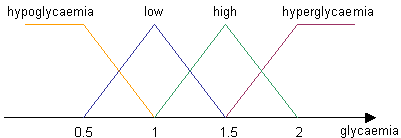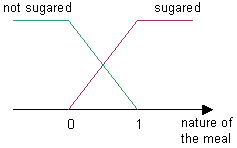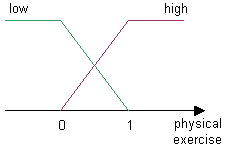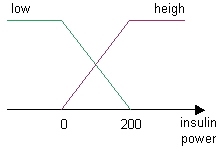Fuzzy inference systems (FIS)
The predictive system is divided into two Takagy-Sugeno FIS: before meal and after meal. Indeed, the "nature of the meal" and "physical exercise" inputs are not significant simultaneously. Reducing the number of inputs in the premises generates less rules and so facilitates the interpretability.
 |
 |
| FIS used in the predictions | |
|---|---|
Glycaemia measurement
Among all entries, the value of the current glycaemia is the more accurate entry. A device takes a drop of blood in order to test it. Should the device be a sensor or a lancet, it is designed to have a small error rate.
Predictions about the nature of the meal and the exercise
Both inputs are the ones that can be the less accurate beacause they are based on
the user's a prori estimations.
The latter may misjudge. Indeed, valuate precisely the glucid strenght of a meal
requires dietetics skills and all diabetics do not.
This requires not only the knowledge of the glucid value of each distinct food,
but also the ability to appreciate the consequences of foodstuffs associations.
For example, glucids contained in a potato won't be assimilated in the same way
whether it is eaten with bred or not.
On the other hand, even if the user is experienced, some unexpecteds may happen
and thwart one's plans.
For example, we can imagine somebody's intents to practise an outdoor sport
discouraged by a sudden rainfall.
Action of the insulin injections
The graphs shown in the
"insulin treatment" section have a pretty rough internal approximation.
Indeed, a more subtle modelisation would be unprofitable, having regard to
dubiousness due to uncertain other inputs (nature of the meal and intended exercise).
Moreover, the effects of the insulin injections vary depending on organisms.
Individually, the curve of the hypoglycemic power of a type of insulin is approximated by an
affine function described like this:
- p is the percentage of the hypoglycemic power acting immediately after the injection
- t0 is the time after which the hypoglycemic power rises from p% up to 100%
- t1 is the time after which the hypoglycemic achieves its maximum
- t2 is the time after which the hypoglycemic decreases to p%
- t3 is the time after which insulin injection is no longer effective
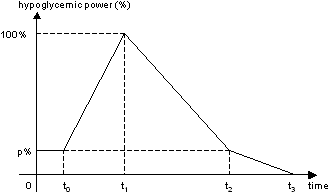
The parameters involved in the modelisation of this graph initially have default values but are adjustable as described in the user manual (french only).
We just saw the way an individual insulin injection is modelised. But the hypoglycemic power of the active insulin in the organism at a given moment is the result of several insulin injections, maybe of different types. Indeed, as we have seen in the insulin treatment section, both regular and lente insulin are used together. To express the resultant hypoglicemic power at a given moment, the additive character of the hypoglycemic power of regular and lente insulin. Moreover, the effects of an injection of insulin may last after the next injection of the same type of insulin. The figure below represents the overlap of insulin actions during a day when a diabetic would make an injection of lente insulin in the morning and in the evenning and an injection of regular insulin before each meal as well.
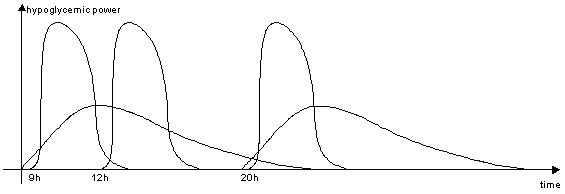 |
| Additive character of the hypoglycemic power of several insulin injections |
|---|
